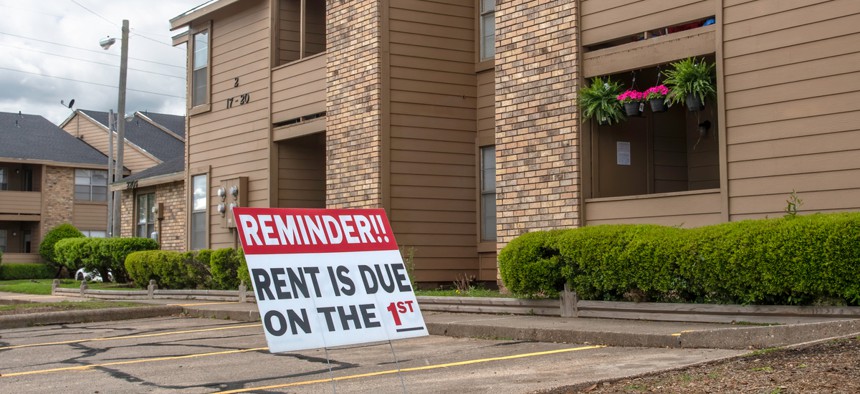One-Month Eviction Moratorium, $25 Billion in Rental Aid in Covid Bill

A sign in the parking lot of an apartment complex in Bossier City, Louisiana on March 30, 2020 reminds tenants that "Rent is due on the 1st." Shutterstock/ Allen J.M. Smith
Housing advocates applauded the inclusion of the emergency rental assistance and eviction moratorium extension in the federal relief package, but said the incoming Biden administration will have to do more.
Renters who have been unable to pay rent during the coronavirus pandemic will be protected from eviction for another month under the Covid-19 relief bill approved Monday by Congress.
The $900 billion deal agreed to by lawmakers after months of negotiations and stalemates extends the Trump administration’s previous eviction moratorium, which would have expired Dec. 31, until the end of January.
While housing experts say the one-month reprieve is insufficient to give people who have been out of work time to save up to make all overdue payments, it will give time for the distribution of emergency housing assistance that is also included in the federal bill.
Under the relief bill, the Treasury Department will fund a $25 billion rental assistance program administered by state and local government entities. The money, which will have to be distributed to state and local governments within 30 days, can be used to help people pay rent and utility bills.
“Extending the moratorium through January provides time for emergency rental assistance to be distributed, and for President-elect Biden to improve and further extend the moratorium immediately after being sworn into office,” said Diane Yentel, CEO of the National Low Income Housing Coalition.
More than 14 million adult renters reported that they were behind on rent as of mid-November, according to the Center for Budget and Policy Priorities. Renters owe an estimated $30 billion to $70 billion in back rent, according to the NLIHC. So, while the $25 billion assistance program will not be enough to provide aid to all who need it, Yentel said the fact it targets aid to the lowest-income renters means that it will ensure the people most at risk of eviction will receive help first.
Earlier in the pandemic, some states and local governments set aside federal relief dollars to help struggling people cover rent. These programs have at times been overwhelmed with applications or run into bureaucratic problems, such as landlords who don’t want to participate.
Provisions of the new Covid bill reserve the rental money for households that make 80% or less of the area median income in their region, have a household member who qualifies for unemployment or has experienced financial hardship due to the pandemic, and can demonstrate a risk of experiencing homelessness. Rental assistance would be prioritized for households whose income does not exceed 50% of the area median income and households in which a renter is currently unemployed and has been so for 90 days or more.
Grants will be distributed at the local level, with state and local entities in charge of administering the program and sending rent payments to landlords.
The rental assistance provisions are just a small portion of the $900 billion coronavirus relief package, which also extends federal unemployment benefits, authorizes direct stimulus payments, and directs another round of Paycheck Protection Program grants to businesses.
Direct aid to state and local governments was not included in the aid package, after Democrats and Republicans were unable to come to agreement over the issue. But some provisions of the bill allocate funding to local government entities for specific purposes, such as the rental assistance program, schools, transit and healthcare.
Democrats have already indicated that they intend to pursue additional funding next year after President-elect Joe Biden takes office.
“The extension of the eviction moratorium will also ensure that families who are behind on their rent are not facing eviction on January 1,” said Rep. Maxine Waters, the chairwoman of the House Committee on Financial Services. “However, I do believe that a longer moratorium will be needed and call on President-elect Biden to use his executive authority to further extend this moratorium once he is sworn into office.”
Greater housing assistance is expected to still be needed as those out of work will likely continue to face mounting financial difficulties, said Eric Tars, legal director at the National Law Center on Homelessness and Poverty. To provide the broadest protections to renters, lawmakers may want to meld elements of the initial federal eviction moratorium contained in the CARES Act, which expired in July, and the Trump administration’s moratorium, which will be extended through the relief bill, he said.
The CARES Act moratorium only covered the 12.3 million renters who live in federally backed housing, about 28% of the nation’s 43 million renters. But it prevented landlords from charging additional fees because of non-payment. The moratorium issued by the Centers for Disease Control and Prevention in September covers all renters, but it does not ban landlords from tacking on interest or fees for non-payment, Tars explained.
“Anyone who isn’t paying is most likely building up lots of fees and interest and it’s all going to hit as soon as this moratorium lifts,” he said.
Editor's note: This story was changed after initial publication to update that Congress passed the legislation.
RELATED on Route Fifty:
Andrea Noble is a staff correspondent with Route Fifty.
NEXT STORY: Congressional Leaders Reach Deal on $900 Billion Covid Relief Package





